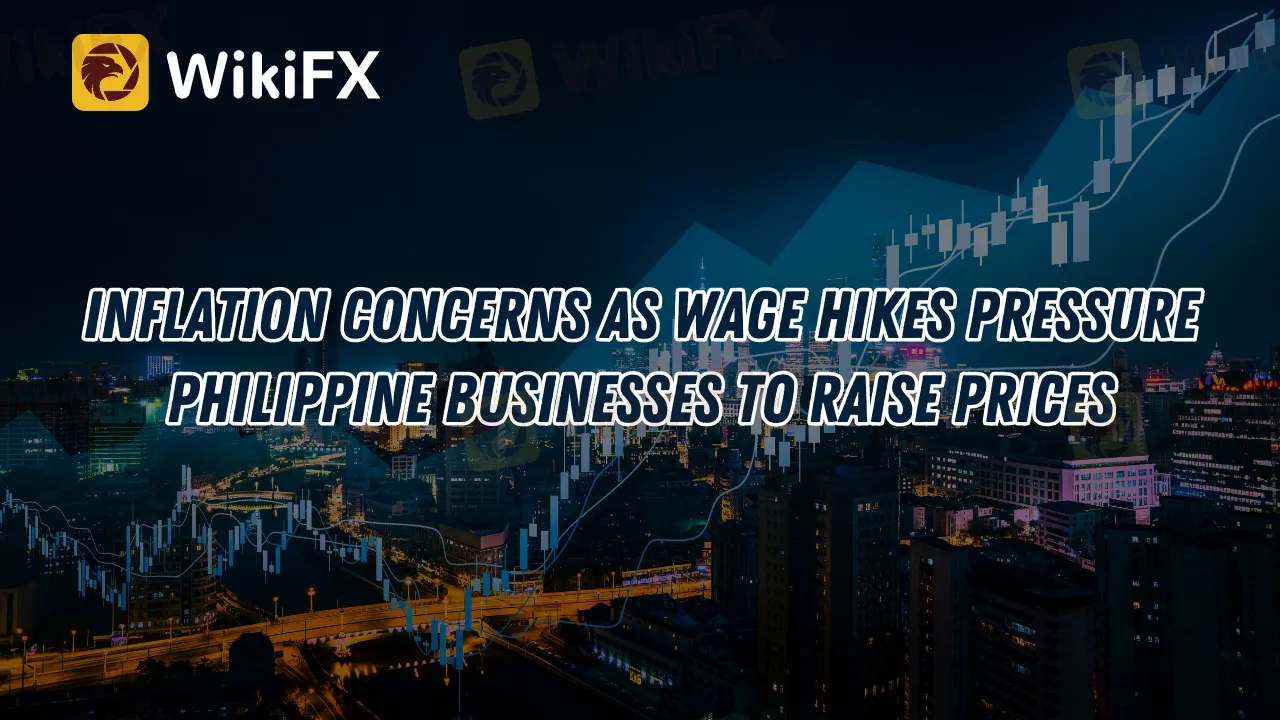简体中文
繁體中文
English
Pусский
日本語
ภาษาไทย
Tiếng Việt
Bahasa Indonesia
Español
हिन्दी
Filippiiniläinen
Français
Deutsch
Português
Türkçe
한국어
العربية
Inflation Concerns as Wage Hikes Pressure Philippine Businesses to Raise Prices
Abstract:Inflation concerns loom in the Philippines as wage hikes put pressure on businesses to increase prices. The recent P40 increase in the NCR's minimum wage could drive up costs for consumers, potentially intensifying inflationary pressures. Despite a slowdown, inflation remains above the Central Bank's goal, while wage hikes are considered vital for boosting workers' purchasing power. Experts suggest alternative strategies like liberalizing food importation to help control inflation, underlining the complex economic balance between wage increases and price stability.

The Philippine Government is faced with an economic conundrum as experts warn against wage hikes that may inadvertently spur inflation. Critics suggest that the Government should focus on measures to mitigate inflation, rather than risking exacerbating the situation through salary increases. These wage hikes might potentially compel businesses to pass on the additional costs to consumers, escalating inflationary pressures.
The National Capital Region (NCR) recently saw a P40 increase in the minimum wage, raising the daily minimum wage to P610 for non-agricultural workers and P573 for workers in the agriculture sector, service retail establishments with 15 or fewer employees, and manufacturing firms with fewer than ten employees.
The hike, though seemingly small, is expected to have a domino effect on smaller businesses. Calixto V. Chikiamco, President of the Foundation for Economic Freedom (FEF), stated that these businesses are likely to transfer these increased costs to consumers. He also highlighted that this strategy would not benefit the majority of workers who are not part of the formal sector and thus, would not enjoy the mandated wage increase.

Mr. Chikiamco advised that the government could instead consider liberalizing food importation to help alleviate food inflation. The strategy, he argued, could provide more significant benefits for those in need, particularly the underprivileged.
Despite a five-month slowdown in inflation, which fell to 5.4% in June from 6.1% in May, total inflation remains over the Bangko Sentral ng Pilipinas' goal zone of 2-4% for the 15th consecutive month. Inflation has averaged 7.2% per year so far, a significant rise over the central bank's revised prediction of 5.4%.
Meanwhile, Cid L. Terosa, Senior Economist at the University of Asia and the Pacific (UA&P), commented that the wage hike might add between 0.06 to 0.1 percentage points to the average inflation for the next six months. However, he also echoed the National Economic and Development Authority (NEDA) statement that the impact of wage hikes on inflation will likely be minimal.

Despite the economic complexities surrounding wage hikes, Hansley A. Juliano, a political economy researcher at Nagoya University, asserts that they play a crucial role in boosting workers' purchasing power, especially amid decreasing money value. He argues that not increasing wages essentially reduces their worth, leading to substandard living conditions for those earning minimum wages.
In contrast to the focus on workers' demands driving inflation, Mr. Juliano points towards the regulation of corporate profits. He referenced a blog by the International Monetary Fund (IMF) economists, which identified rising corporate profits accounting for about half of Europe's inflation increase over the past two years.
Amid these discussions, numerous labor organizations in the Philippines are lobbying for further wage hikes in other regions. By September, the regional wage boards of Central Luzon, Calabarzon, Western Visayas, and Central Visayas are expected to decide on these petitions.
The Philippines finds itself at a crossroads, striving to strike a balance between wage hikes and inflation. While the path ahead remains fraught with challenges, the hope is to find solutions that will ensure economic stability and improved living conditions for its citizens.
Stay informed on the latest updates by downloading the WikiFX App on your smartphone. Download the App here: https://www.wikifx.com/en/download.html

Disclaimer:
The views in this article only represent the author's personal views, and do not constitute investment advice on this platform. This platform does not guarantee the accuracy, completeness and timeliness of the information in the article, and will not be liable for any loss caused by the use of or reliance on the information in the article.
Related broker
Read more

ATFX Enhances Trading Platform with BlackArrow Integration
ATFX integrates the BlackArrow trading platform, offering advanced tools for forex, crypto, and stocks with automation and real-time analytics for traders.

Exposing the Truth: What Happened with the Losses of Thousands of Dollars on the GlobTFX Platform?
The facts are clear and undeniably shocking—GlobTFX has caused significant financial losses to well-known traders in the Arab world. Eighteen victims have confirmed a total loss exceeding $22,372! But this is just the tip of the iceberg…

UK Hits HSBC, 3 Banks with £104.4M Fine for Bond Misconduct
HSBC, Citi, RBC, and Morgan Stanley fined £104.4M by CMA for sharing sensitive bond market info, distorting UK gilts competition from 2009-2013.

XTB Secures Chilean License, Expands Latin America Footprint
XTB gains a securities agent license in Chile, boosting its Latin America presence. The broker plans to offer stocks, ETFs, and derivatives to local investors.
WikiFX Broker
Latest News
Germany's Election: Immigration, Economy & Political Tensions Take Centre Stage
WikiFX Review: Is IVY Markets Reliable?
Brazilian Man Charged in $290 Million Crypto Ponzi Scheme Affecting 126,000 Investors
Become a Full-Time FX Trader in 6 Simple Steps
ATFX Enhances Trading Platform with BlackArrow Integration
IG 2025 Most Comprehensive Review
Construction Datuk Director Loses RM26.6 Mil to UVKXE Crypto Scam
SEC Drops Coinbase Lawsuit, Signals Crypto Policy Shift
Should You Choose Rock-West or Avoid it?
Scam Couple behind NECCORPO Arrested by Thai Authorities
Currency Calculator






